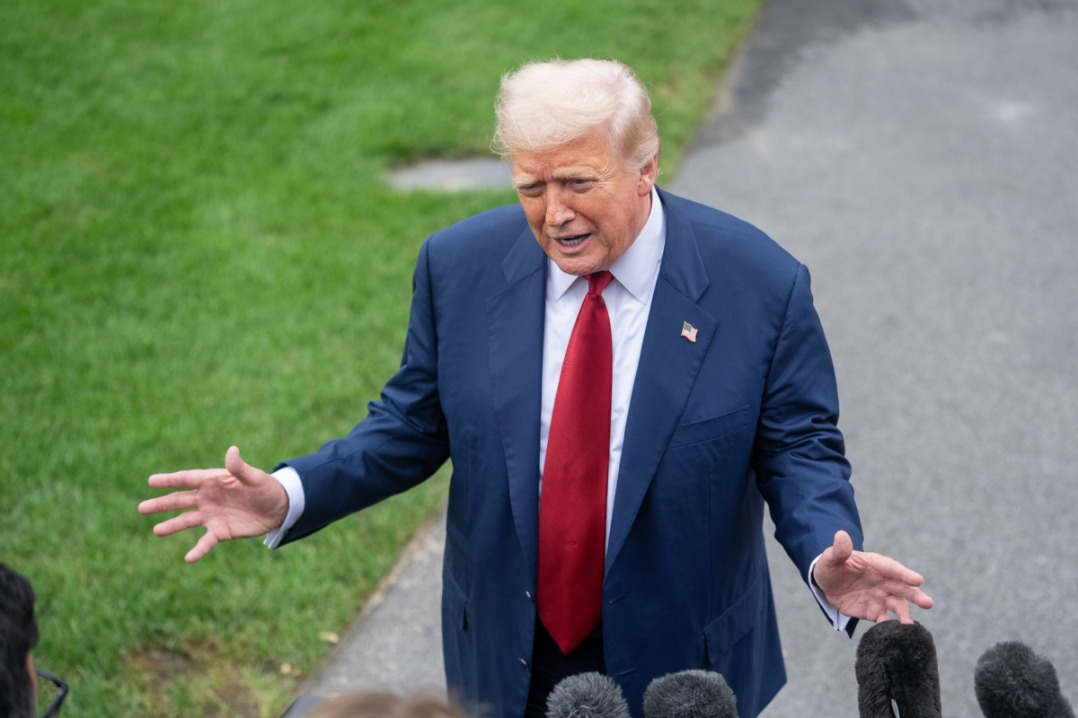Why stable China-US trade matters more than ever

In a time of rising global economic uncertainty and geopolitical fragmentation, the trade relationship between China and the United States remains one of the world's most consequential. Despite current tensions, it is critical to recognize that economic cooperation between the world's two largest economies is not just a bilateral matter — it is a stabilizing force with global implications.
Historically, China-US trade has been broadly mutually beneficial, contributing to prosperity and innovation in both nations. While China has consistently maintained a trade surplus in goods — fueled in part by its strength in manufacturing and export-driven growth — the US has benefited from a significant surplus in services, including education, entertainment, tourism, financial services and intellectual property licensing. US firms, particularly in the consumer, automotive, pharmaceutical and tech sectors, have flourished by tapping into China's vast and increasingly affluent domestic market. Many of these firms also benefit from access to highly educated Chinese talent, which has enriched their global competitiveness.
Conversely, Chinese companies have gained immensely from their access to US capital markets, advanced technologies and management practices. Listing on US exchanges has enabled Chinese firms to raise capital efficiently and adopt international governance standards. Many have used this foundation to modernize operations, strengthen global branding and accelerate international expansion. These interdependencies have created a deep, if complex, web of economic linkages that have underpinned global growth and innovation for decades.
However, at its core, the current trade frictions stem not from trade imbalances alone, but from broader concerns around technological leadership, national security and economic dependency. The challenge lies in managing strategic competition without undermining the significant mutual value created through trade between the two countries.
As both countries navigate the complexities of a shifting geopolitical landscape, it is increasingly clear that trade policy is no longer only about economic efficiency or comparative advantage. It is now deeply intertwined with national strategy. US concerns about intellectual property protection, cybersecurity and technology transfers are mirrored by Chinese concerns about trade restrictions and over-dependence on foreign technologies. These underlying anxieties feed into a cycle of suspicion and countermeasures, complicating efforts to maintain open channels for commerce. The task, therefore, is not simply to rebalance trade flows, but to reestablish a working relationship grounded in transparency, reciprocity and mutual respect.
Recent trade engagements in Geneva and London mark a modest but meaningful turning point. With both the US trade representative and the US secretary of commerce participating, it's clear that tariffs and export controls are now being negotiated in parallel — reflecting the central role of strategic technologies in the evolving trade agenda. The US trade representative and the secretary of commerce have jurisdiction over tariffs and export controls, respectively. This is no longer a conventional trade dispute centered on deficits and surpluses. It is a structural negotiation about the rules governing 21st-century innovation and industrial policy. The presence of both senior US officials also signals a recognition that economic statecraft must be coordinated across agencies to be effective.
Early signs of reciprocity
China lifting blocks on critical minerals such as rare earths and the US offering limited easing of export controls on aircraft parts, software and certain semiconductors are promising developments. While no formal agreement has emerged, the professional tone and shared willingness to reengage inspire cautious optimism. Crucially, these talks suggest that neither side wants a breakdown in dialogue. Instead, there appears to be a growing recognition that a tit-for-tat approach to policymaking is unsustainable. If both sides continue to engage with a commitment to parallel, good-faith actions, the result could be a more stable and constructive economic relationship.
But the risks of missteps remain. Calls for "decoupling" have gained political traction in both countries, yet the economic consequences of such a move would be severe. Interdependence, especially in areas like rare earths, semiconductors and pharmaceuticals, is not a vulnerability — it is a strength that capitalizes on each other's competitive advantages. Full-scale disengagement would undermine global supply chains, increase costs and diminish the efficiency that has powered decades of shared prosperity. In a world of interlocking economic systems, decoupling would also reduce the incentives for diplomatic cooperation, increasing the risk of misunderstanding and miscalculation.
The rare earths sector offers a cautionary tale. China currently dominates global refining capacity for these critical materials, which are essential for goods such as smartphones, electric vehicles and military equipment. US efforts to develop domestic alternatives are hampered by environmental, financial and regulatory challenges.
At the same time, while Chinese firms like Huawei have made impressive gains in chip design and telecommunications, it will take years to match the depth and sophistication of US firms like Nvidia or Intel. This mutual dependency suggests that selective diversification and greater resilience are necessary, but a wholesale separation is both impractical and counterproductive.
That view is echoed by the latest survey from AmCham China, which found that most US firms remain committed to operating in China despite higher tariffs and mounting political pressure. This is not sentimentality — it is pragmatism. China offers scale, skilled talent and an integrated industrial base that cannot be easily replicated. Companies are localizing supply chains and managing risks, but few are prepared to walk away from one of the world's largest consumer markets.
For the broader global trading system, resilience depends on predictability and rules-based governance. In response to unilateral tariff actions, countries should recommit to multilateralism, support regional trade frameworks and modernize institutions like the WTO. Importantly, nations must resist retaliatory measures and instead focus on long-term strategies such as building diversified, geopolitically balanced supply chains. Transparency, regulatory coherence and dispute resolution mechanisms must be reinforced to ensure that global commerce remains a positive-sum game.
China's own role as a pillar of global economic stability cannot be overstated. Throughout the 2008 financial crisis and the pandemic-era recovery, China's steady macroeconomic policies contributed to global confidence. Amid today's uncertainty, China's continued policy stability provides reassurance to international investors and developing economies alike. A stable China supports global growth, cushions shocks in emerging markets and adds predictability to an increasingly volatile world order.
With greater economic influence, however, comes greater responsibility. Global stakeholders increasingly expect China — and all other major economies — to uphold principles of openness, regulatory transparency, and fair, reciprocal trade. Upholding these principles will be critical to deepening trust and sustaining mutually beneficial relationships with partners around the world. Meeting these expectations will also help China demonstrate global leadership in trade governance at a time when institutions are under strain.
There is still a window to shift from confrontation to constructive — even if competitive — coexistence. Strategic competition needs not preclude cooperation, especially in areas of shared interest such as climate change, public health, artificial intelligence and global security. A functioning, forward-looking China-US economic relationship is not just desirable; it is indispensable for global progress.
The writer is executive vice-chancellor, American president and distinguished professor of social science at Duke Kunshan University in China and the John deButts professor of practice at Duke University's Fuqua School of Business in the United States.
The views do not necessarily reflect those of China Daily.

Today's Top News
- Unified national market a new growth launchpad
- US deal a structural challenge for Japan
- Industrial prowess of China a subject of serious study
- US new tariffs 'unfair': Experts
- NDRC recalibrating steps to drive growth, boost demand
- Wartime hero's legacy fortifies Sino-UK bond






























